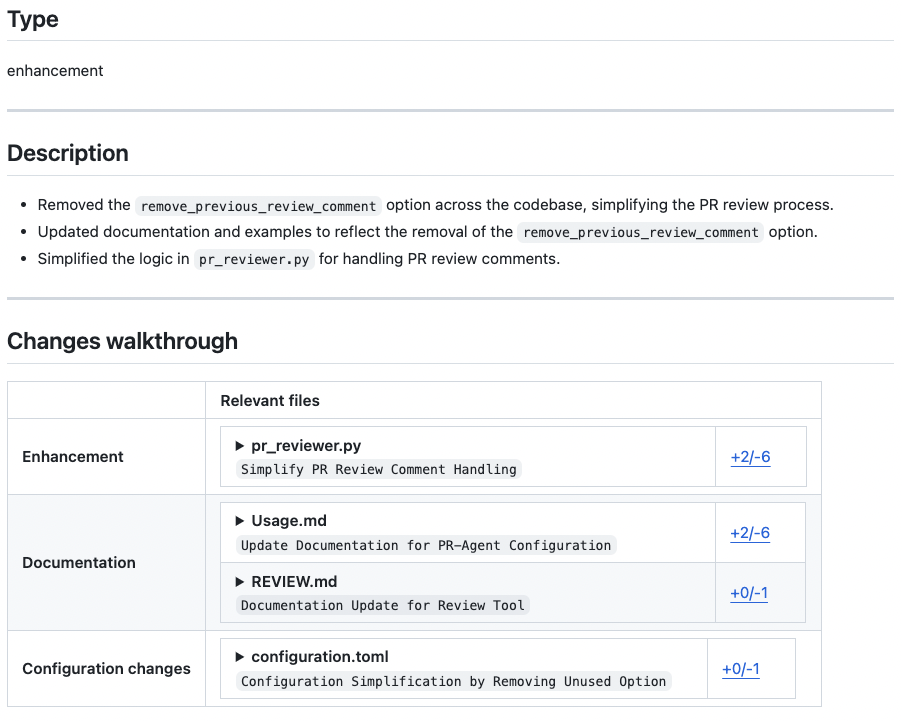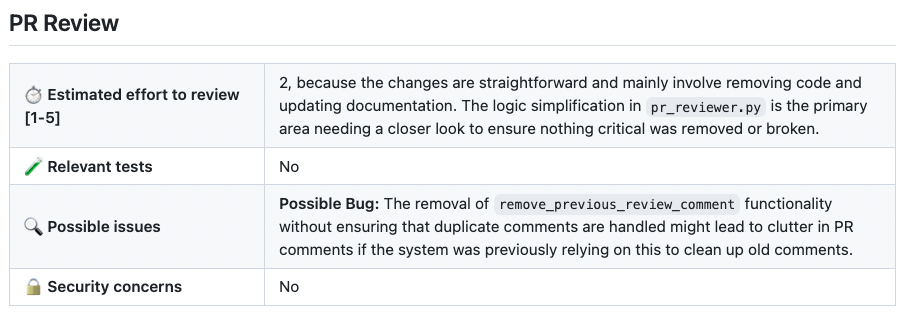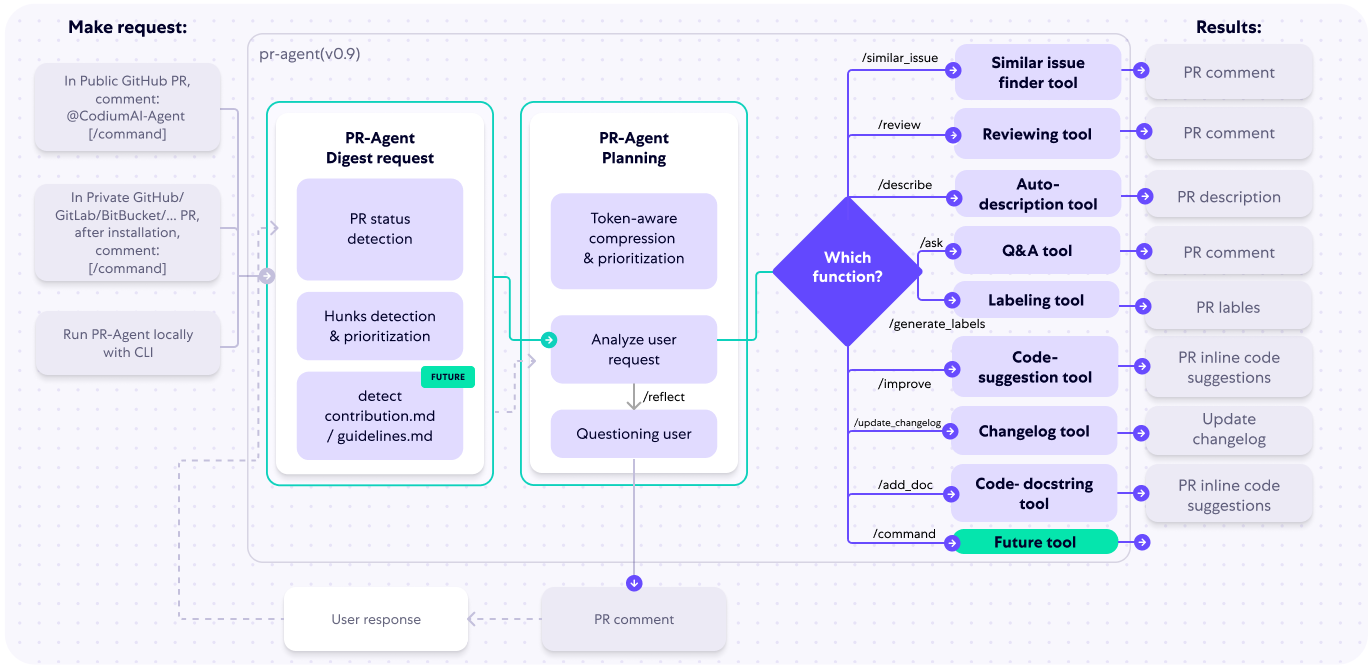
pr-agent
🚀 PR-Agent (Qodo Merge open-source): An AI-Powered 🤖 Tool for Automated Pull Request Analysis, Feedback, Suggestions and More! 💻🔍
Stars: 7448
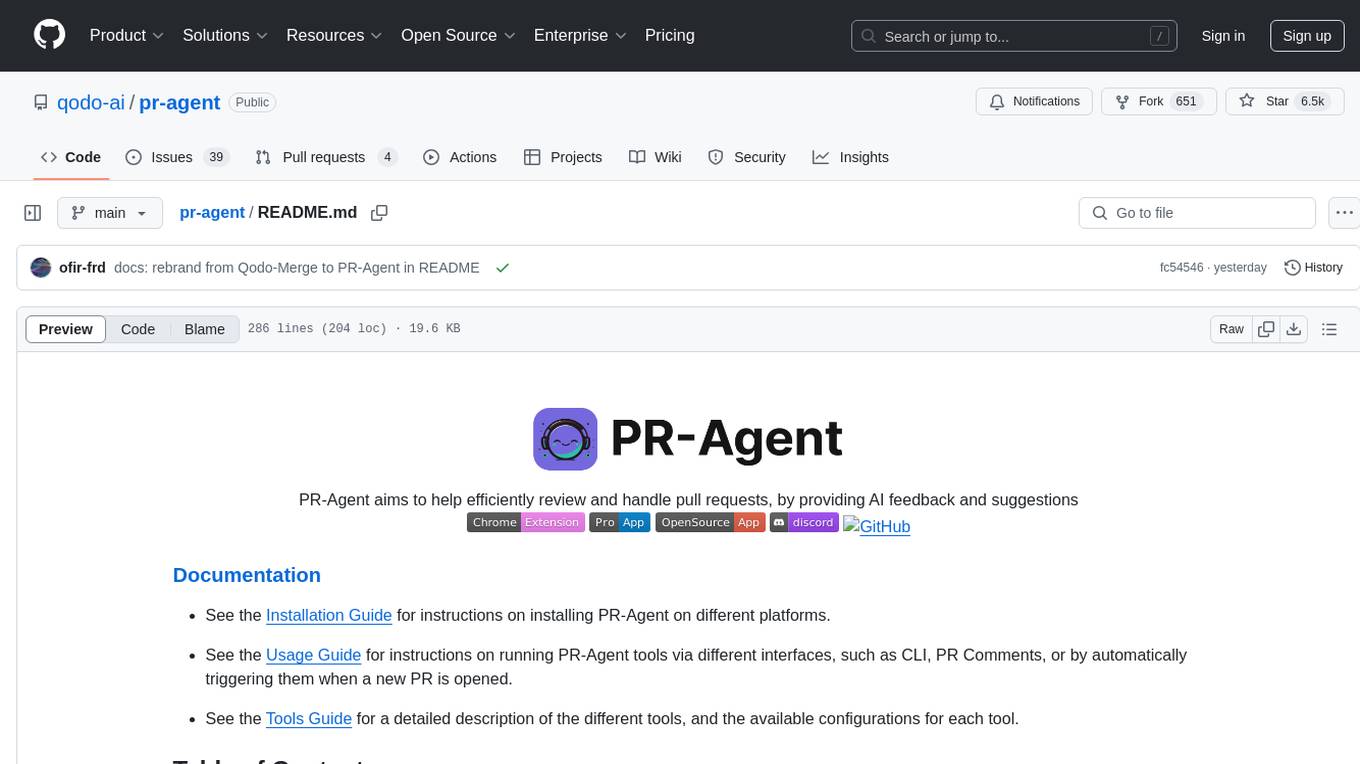
PR-Agent is a tool designed to assist in efficiently reviewing and handling pull requests by providing AI feedback and suggestions. It offers various tools such as Review, Describe, Improve, Ask, Update CHANGELOG, and more, with the ability to run them via different interfaces like CLI, PR Comments, or automatically triggering them when a new PR is opened. The tool supports multiple git platforms and models, emphasizing real-life practical usage and modular, customizable tools.
README:

Installation Guide | Usage Guide | Tools Guide | Qodo Merge 💎
PR-Agent aims to help efficiently review and handle pull requests, by providing AI feedback and suggestions
A new version, v0.28, was released. See release notes here.
This version includes a new tool, Help Docs, which can answer free-text questions based on a documentation folder.
/help_docs is now being used to provide immediate automatic feedback to any user who opens an issue on PR-Agent's open-source project
A new version, v0.27, was released. See release notes here.
- Updated the default model to
o3-minifor all tools. You can still use thegpt-4oas the default model by setting themodelparameter in the configuration file. - Important updates and bug fixes for Azure DevOps, see here
- Added support for adjusting the response language of the PR-Agent tools.
Following feedback from the community, we have addressed two vulnerabilities identified in the open-source PR-Agent project. The fixes are now included in the newly released version (v0.26), available as of today.
Supported commands per platform:
| GitHub | GitLab | Bitbucket | Azure DevOps | ||
|---|---|---|---|---|---|
| TOOLS | Review | ✅ | ✅ | ✅ | ✅ |
| Describe | ✅ | ✅ | ✅ | ✅ | |
| Improve | ✅ | ✅ | ✅ | ✅ | |
| Ask | ✅ | ✅ | ✅ | ✅ | |
| ⮑ Ask on code lines | ✅ | ✅ | |||
| Update CHANGELOG | ✅ | ✅ | ✅ | ✅ | |
| Help Docs | ✅ | ✅ | ✅ | ||
| Ticket Context 💎 | ✅ | ✅ | ✅ | ||
| Utilizing Best Practices 💎 | ✅ | ✅ | ✅ | ||
| PR Chat 💎 | ✅ | ||||
| Suggestion Tracking 💎 | ✅ | ✅ | |||
| CI Feedback 💎 | ✅ | ||||
| PR Documentation 💎 | ✅ | ✅ | |||
| Custom Labels 💎 | ✅ | ✅ | |||
| Analyze 💎 | ✅ | ✅ | |||
| Similar Code 💎 | ✅ | ||||
| Custom Prompt 💎 | ✅ | ✅ | ✅ | ||
| Test 💎 | ✅ | ✅ | |||
| Implement 💎 | ✅ | ✅ | ✅ | ||
| Auto-Approve 💎 | ✅ | ✅ | ✅ | ||
| USAGE | CLI | ✅ | ✅ | ✅ | ✅ |
| App / webhook | ✅ | ✅ | ✅ | ✅ | |
| Tagging bot | ✅ | ||||
| Actions | ✅ | ✅ | ✅ | ✅ | |
| CORE | PR compression | ✅ | ✅ | ✅ | ✅ |
| Adaptive and token-aware file patch fitting | ✅ | ✅ | ✅ | ✅ | |
| Multiple models support | ✅ | ✅ | ✅ | ✅ | |
| Local and global metadata | ✅ | ✅ | ✅ | ✅ | |
| Dynamic context | ✅ | ✅ | ✅ | ✅ | |
| Self reflection | ✅ | ✅ | ✅ | ✅ | |
| Static code analysis 💎 | ✅ | ✅ | |||
| Global and wiki configurations 💎 | ✅ | ✅ | ✅ | ||
| PR interactive actions 💎 | ✅ | ✅ | |||
| Impact Evaluation 💎 | ✅ | ✅ |
- 💎 means this feature is available only in Qodo-Merge
‣ Auto Description (/describe): Automatically generating PR description - title, type, summary, code walkthrough and labels.
‣ Auto Review (/review): Adjustable feedback about the PR, possible issues, security concerns, review effort and more.
‣ Code Suggestions (/improve): Code suggestions for improving the PR.
‣ Question Answering (/ask ...): Answering free-text questions about the PR.
‣ Update Changelog (/update_changelog): Automatically updating the CHANGELOG.md file with the PR changes.
‣ Help Docs (/help_docs): Answers a question on any repository by utilizing given documentation.
‣ Add Documentation 💎 (/add_docs): Generates documentation to methods/functions/classes that changed in the PR.
‣ Generate Custom Labels 💎 (/generate_labels): Generates custom labels for the PR, based on specific guidelines defined by the user.
‣ Analyze 💎 (/analyze): Identify code components that changed in the PR, and enables to interactively generate tests, docs, and code suggestions for each component.
‣ Test 💎 (/test): Generate tests for a selected component, based on the PR code changes.
‣ Custom Prompt 💎 (/custom_prompt): Automatically generates custom suggestions for improving the PR code, based on specific guidelines defined by the user.
‣ Generate Tests 💎 (/test component_name): Generates unit tests for a selected component, based on the PR code changes.
‣ CI Feedback 💎 (/checks ci_job): Automatically generates feedback and analysis for a failed CI job.
‣ Similar Code 💎 (/find_similar_component): Retrieves the most similar code components from inside the organization's codebase, or from open-source code.
‣ Implement 💎 (/implement): Generates implementation code from review suggestions.
Try the Claude Sonnet powered PR-Agent instantly on your public GitHub repository. Just mention @CodiumAI-Agent and add the desired command in any PR comment. The agent will generate a response based on your command.
For example, add a comment to any pull request with the following text:
@CodiumAI-Agent /review
and the agent will respond with a review of your PR.
Note that this is a promotional bot, suitable only for initial experimentation.
It does not have 'edit' access to your repo, for example, so it cannot update the PR description or add labels (@CodiumAI-Agent /describe will publish PR description as a comment). In addition, the bot cannot be used on private repositories, as it does not have access to the files there.
Qodo Merge is a hosted version of PR-Agent, provided by Qodo. It is available for a monthly fee, and provides the following benefits:
- Fully managed - We take care of everything for you - hosting, models, regular updates, and more. Installation is as simple as signing up and adding the Qodo Merge app to your GitHub\GitLab\BitBucket repo.
- Improved privacy - No data will be stored or used to train models. Qodo Merge will employ zero data retention, and will use an OpenAI account with zero data retention.
- Improved support - Qodo Merge users will receive priority support, and will be able to request new features and capabilities.
- Extra features -In addition to the benefits listed above, Qodo Merge will emphasize more customization, and the usage of static code analysis, in addition to LLM logic, to improve results. See here for a list of features available in Qodo Merge.
The following diagram illustrates PR-Agent tools and their flow:
Check out the PR Compression strategy page for more details on how we convert a code diff to a manageable LLM prompt
A reasonable question that can be asked is: "Why use PR-Agent? What makes it stand out from existing tools?"
Here are some advantages of PR-Agent:
- We emphasize real-life practical usage. Each tool (review, improve, ask, ...) has a single LLM call, no more. We feel that this is critical for realistic team usage - obtaining an answer quickly (~30 seconds) and affordably.
- Our PR Compression strategy is a core ability that enables to effectively tackle both short and long PRs.
- Our JSON prompting strategy enables to have modular, customizable tools. For example, the '/review' tool categories can be controlled via the configuration file. Adding additional categories is easy and accessible.
- We support multiple git providers (GitHub, Gitlab, Bitbucket), multiple ways to use the tool (CLI, GitHub Action, GitHub App, Docker, ...), and multiple models (GPT, Claude, Deepseek, ...)
- If you host PR-Agent with your OpenAI API key, it is between you and OpenAI. You can read their API data privacy policy here: https://openai.com/enterprise-privacy
-
When using Qodo Merge 💎, hosted by Qodo, we will not store any of your data, nor will we use it for training. You will also benefit from an OpenAI account with zero data retention.
-
For certain clients, Qodo-hosted Qodo Merge will use Qodo’s proprietary models — if this is the case, you will be notified.
-
No passive collection of Code and Pull Requests’ data — Qodo Merge will be active only when you invoke it, and it will then extract and analyze only data relevant to the executed command and queried pull request.
- The Qodo Merge Chrome extension serves solely to modify the visual appearance of a GitHub PR screen. It does not transmit any user's repo or pull request code. Code is only sent for processing when a user submits a GitHub comment that activates a PR-Agent tool, in accordance with the standard privacy policy of Qodo-Merge.
- Discord community: https://discord.gg/kG35uSHDBc
- Qodo site: https://www.qodo.ai/
- Blog: https://www.qodo.ai/blog/
- Troubleshooting: https://www.qodo.ai/blog/technical-faq-and-troubleshooting/
- Support: [email protected]
For Tasks:
Click tags to check more tools for each tasksFor Jobs:
Alternative AI tools for pr-agent
Similar Open Source Tools

pr-agent
PR-Agent is a tool designed to assist in efficiently reviewing and handling pull requests by providing AI feedback and suggestions. It offers various tools such as Review, Describe, Improve, Ask, Update CHANGELOG, and more, with the ability to run them via different interfaces like CLI, PR Comments, or automatically triggering them when a new PR is opened. The tool supports multiple git platforms and models, emphasizing real-life practical usage and modular, customizable tools.
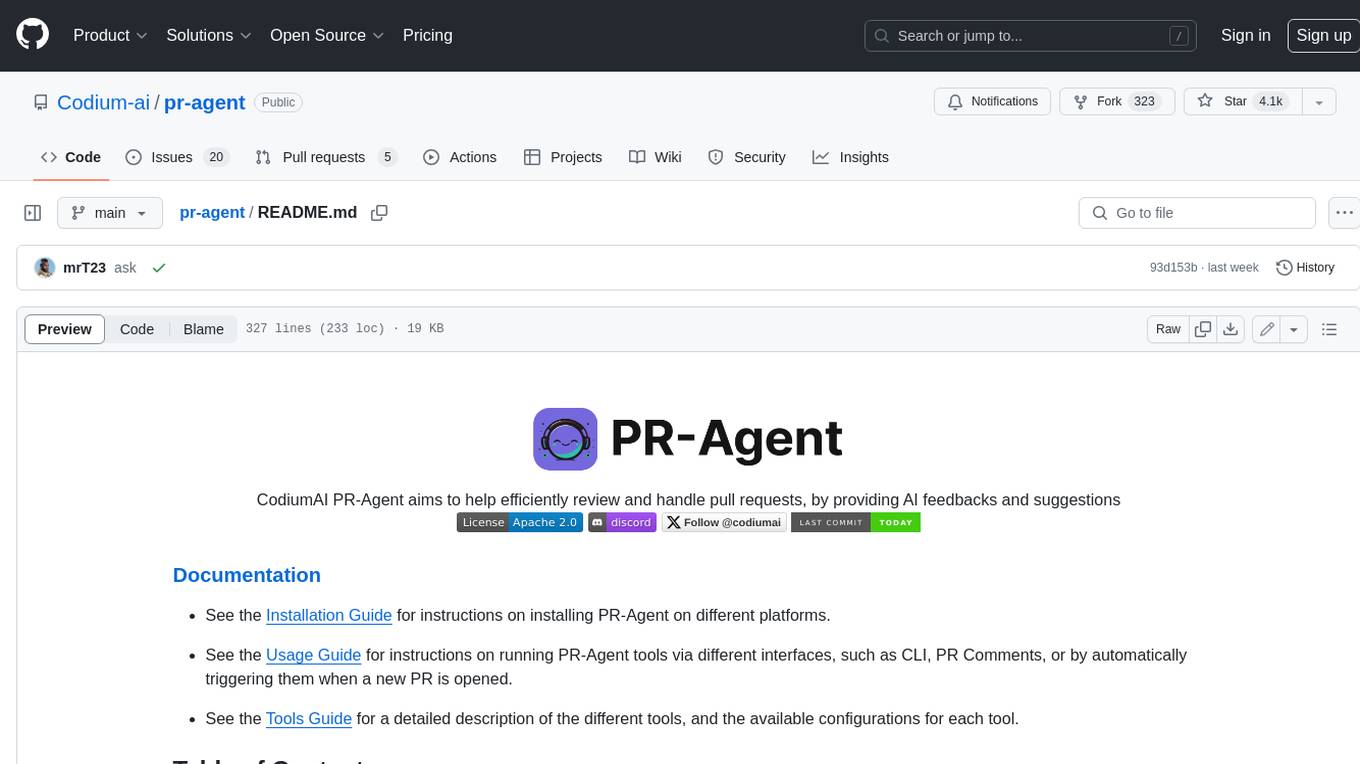
pr-agent
PR-Agent is a tool that helps to efficiently review and handle pull requests by providing AI feedbacks and suggestions. It supports various commands such as generating PR descriptions, providing code suggestions, answering questions about the PR, and updating the CHANGELOG.md file. PR-Agent can be used via CLI, GitHub Action, GitHub App, Docker, and supports multiple git providers and models. It emphasizes real-life practical usage, with each tool having a single GPT-4 call for quick and affordable responses. The PR Compression strategy enables effective handling of both short and long PRs, while the JSON prompting strategy allows for modular and customizable tools. PR-Agent Pro, the hosted version by CodiumAI, provides additional benefits such as full management, improved privacy, priority support, and extra features.
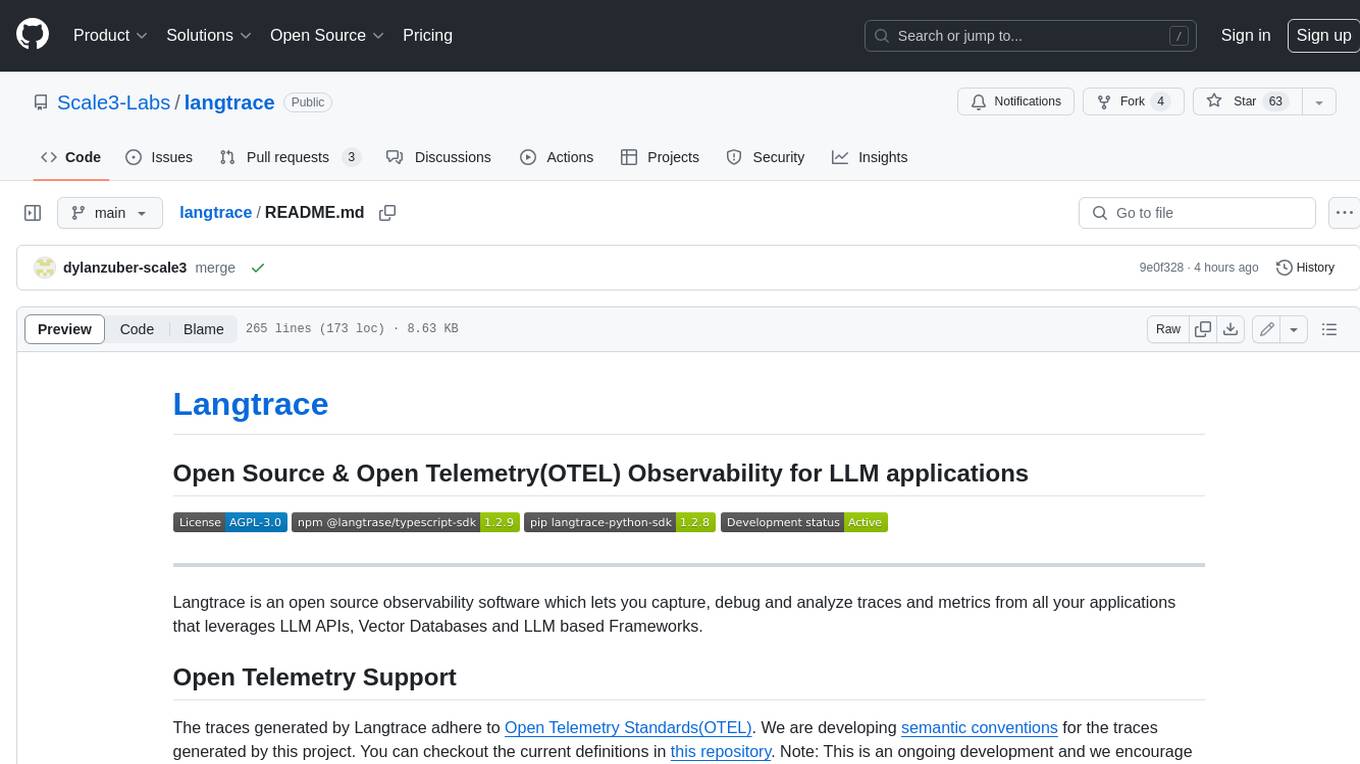
langtrace
Langtrace is an open source observability software that lets you capture, debug, and analyze traces and metrics from all your applications that leverage LLM APIs, Vector Databases, and LLM-based Frameworks. It supports Open Telemetry Standards (OTEL), and the traces generated adhere to these standards. Langtrace offers both a managed SaaS version (Langtrace Cloud) and a self-hosted option. The SDKs for both Typescript/Javascript and Python are available, making it easy to integrate Langtrace into your applications. Langtrace automatically captures traces from various vendors, including OpenAI, Anthropic, Azure OpenAI, Langchain, LlamaIndex, Pinecone, and ChromaDB.
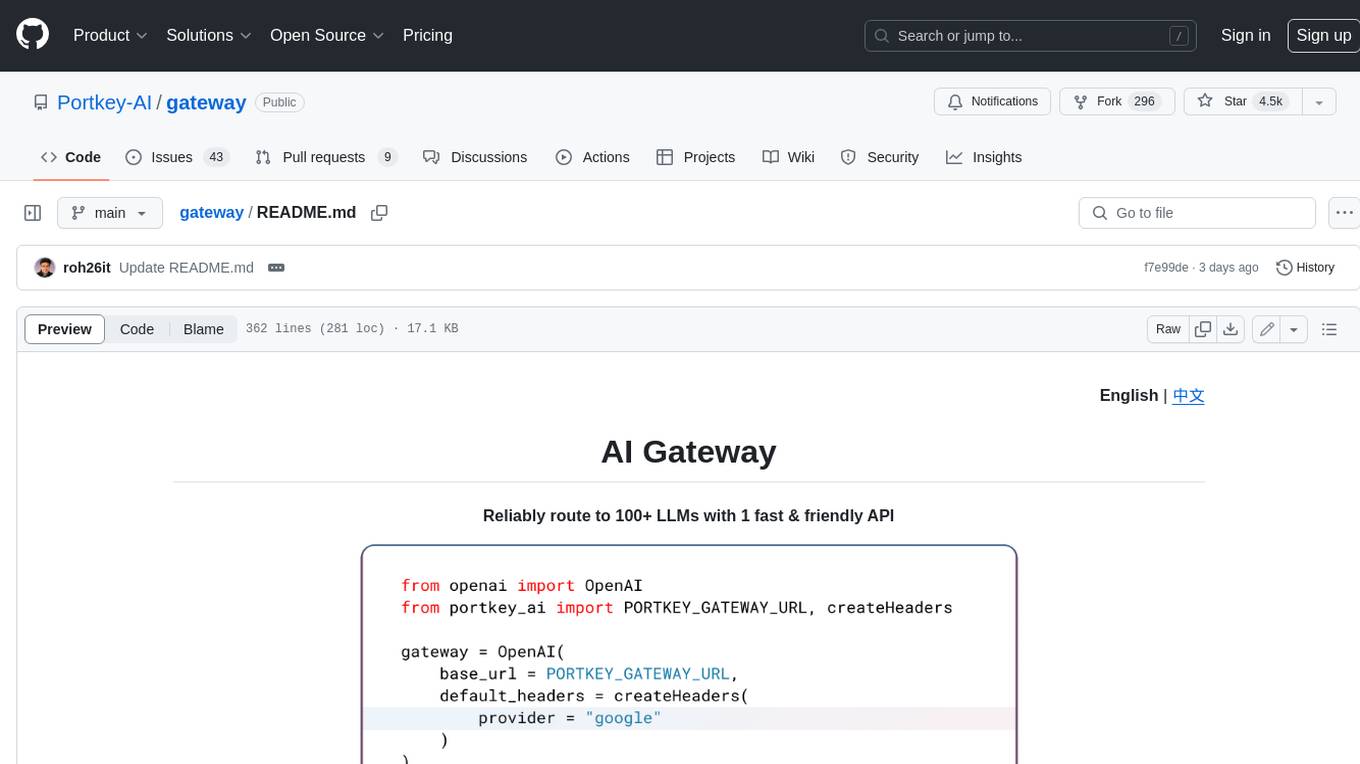
gateway
Gateway is a tool that streamlines requests to 100+ open & closed source models with a unified API. It is production-ready with support for caching, fallbacks, retries, timeouts, load balancing, and can be edge-deployed for minimum latency. It is blazing fast with a tiny footprint, supports load balancing across multiple models, providers, and keys, ensures app resilience with fallbacks, offers automatic retries with exponential fallbacks, allows configurable request timeouts, supports multimodal routing, and can be extended with plug-in middleware. It is battle-tested over 300B tokens and enterprise-ready for enhanced security, scale, and custom deployments.
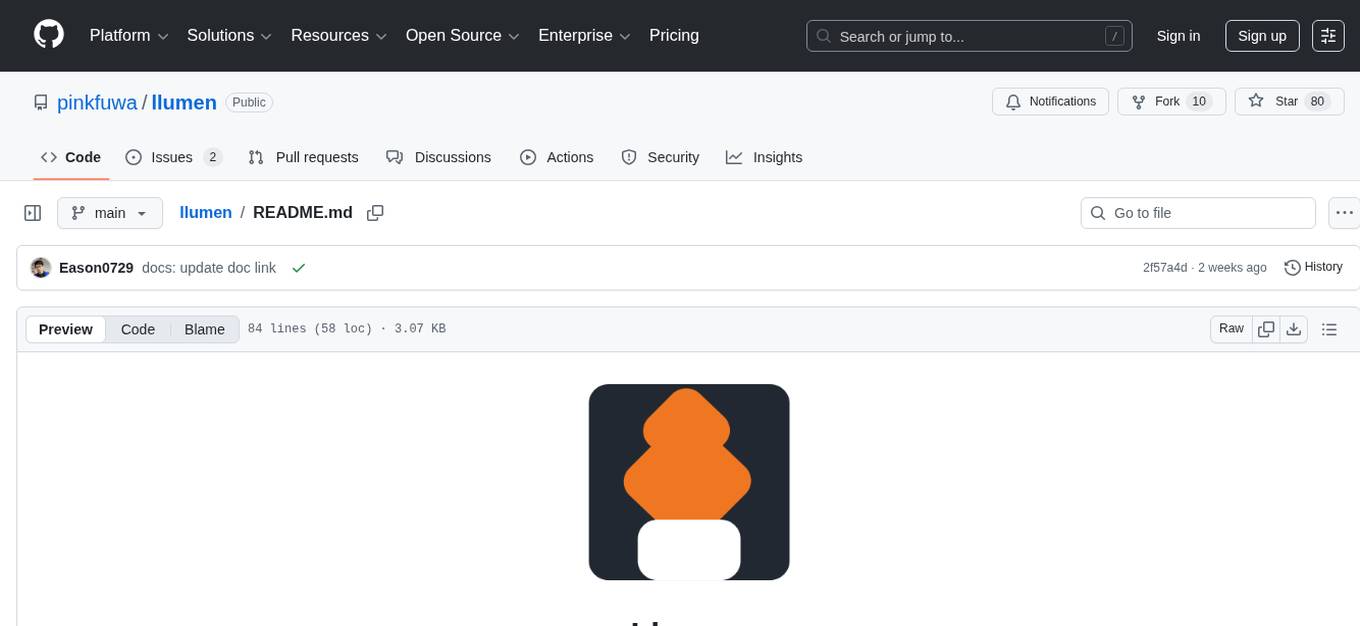
llumen
Llumen is a self-hosted interface optimized for modest hardware like Raspberry Pi, old laptops, and minimal VPS. It offers privacy without complexity, providing essential features with minimal resource demands. Users can enjoy sub-second cold starts, real-time token streaming, various chat modes, rich media support, and a universal API for OpenAI-compatible providers. The tool has a small footprint with a binary size of around 17MB and RAM usage under 128MB. Llumen aims to simplify the setup process and offer a user-friendly experience for individuals seeking a privacy-focused solution.
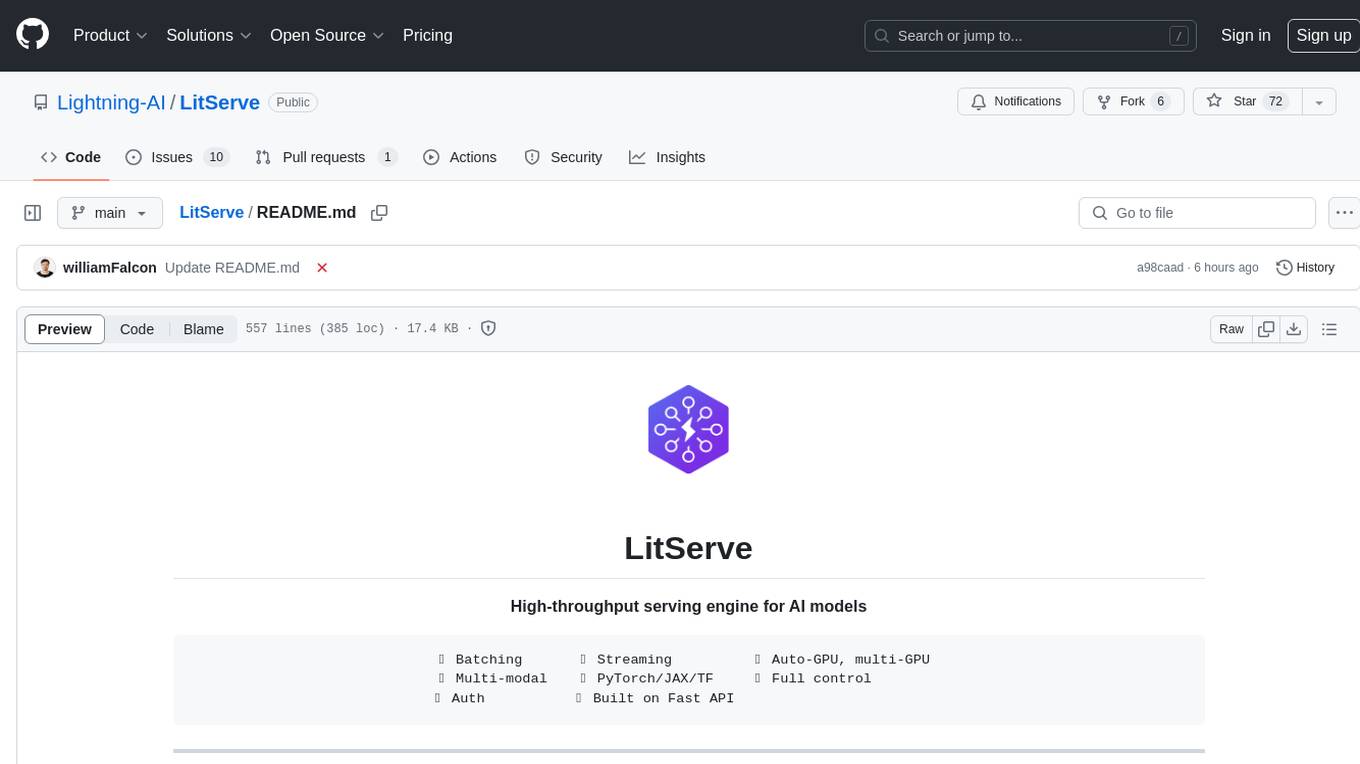
LitServe
LitServe is a high-throughput serving engine designed for deploying AI models at scale. It generates an API endpoint for models, handles batching, streaming, and autoscaling across CPU/GPUs. LitServe is built for enterprise scale with a focus on minimal, hackable code-base without bloat. It supports various model types like LLMs, vision, time-series, and works with frameworks like PyTorch, JAX, Tensorflow, and more. The tool allows users to focus on model performance rather than serving boilerplate, providing full control and flexibility.
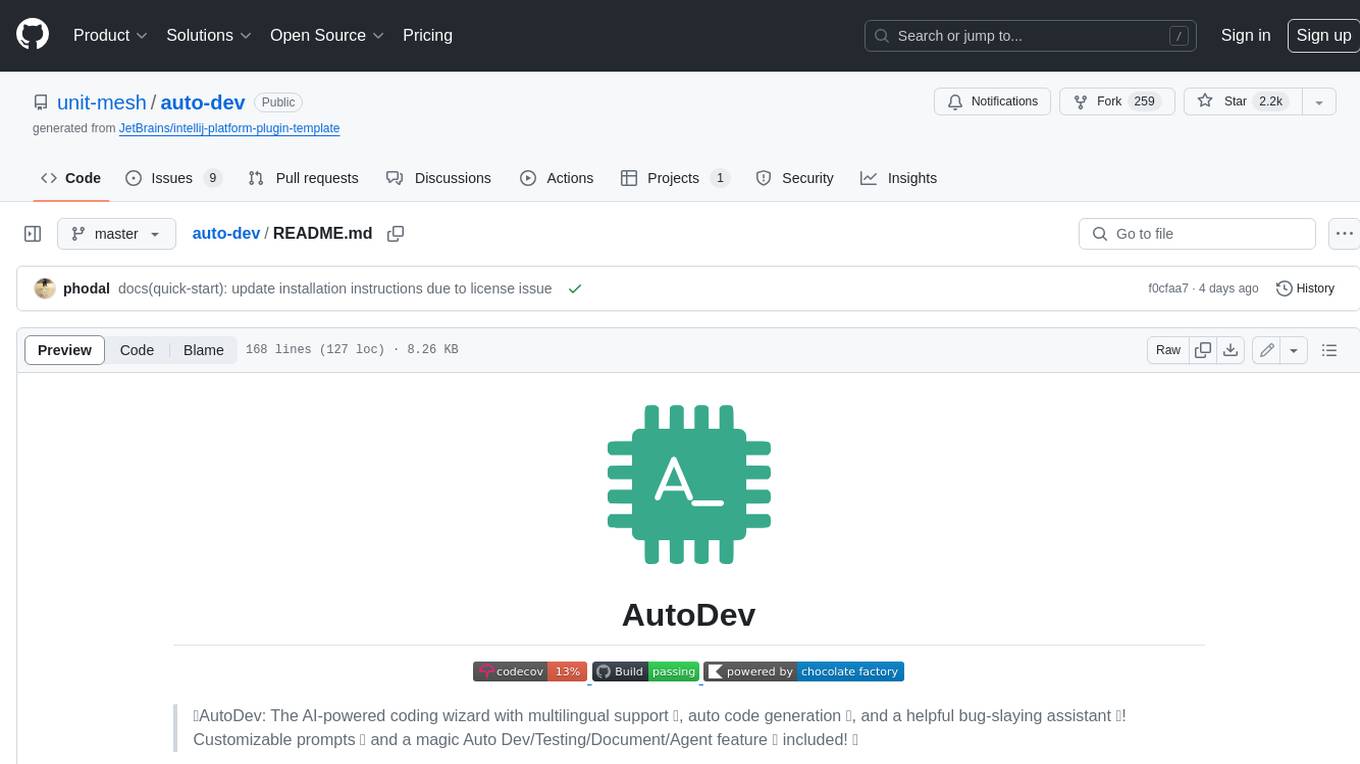
auto-dev
AutoDev is an AI-powered coding wizard that supports multiple languages, including Java, Kotlin, JavaScript/TypeScript, Rust, Python, Golang, C/C++/OC, and more. It offers a range of features, including auto development mode, copilot mode, chat with AI, customization options, SDLC support, custom AI agent integration, and language features such as language support, extensions, and a DevIns language for AI agent development. AutoDev is designed to assist developers with tasks such as auto code generation, bug detection, code explanation, exception tracing, commit message generation, code review content generation, smart refactoring, Dockerfile generation, CI/CD config file generation, and custom shell/command generation. It also provides a built-in LLM fine-tune model and supports UnitEval for LLM result evaluation and UnitGen for code-LLM fine-tune data generation.
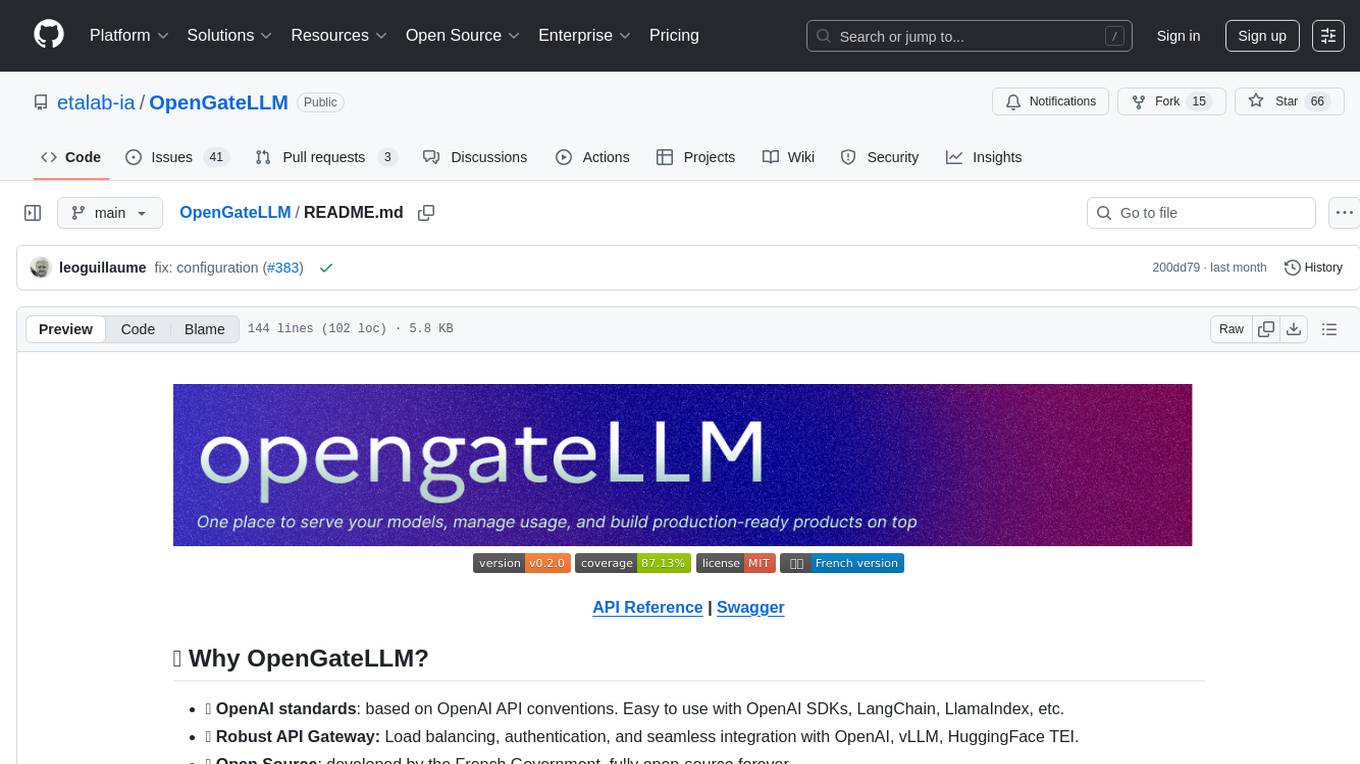
OpenGateLLM
OpenGateLLM is an open-source API gateway developed by the French Government, designed to serve AI models in production. It follows OpenAI standards and offers robust features like RAG integration, audio transcription, OCR, and more. With support for multiple AI backends and built-in security, OpenGateLLM provides a production-ready solution for various AI tasks.
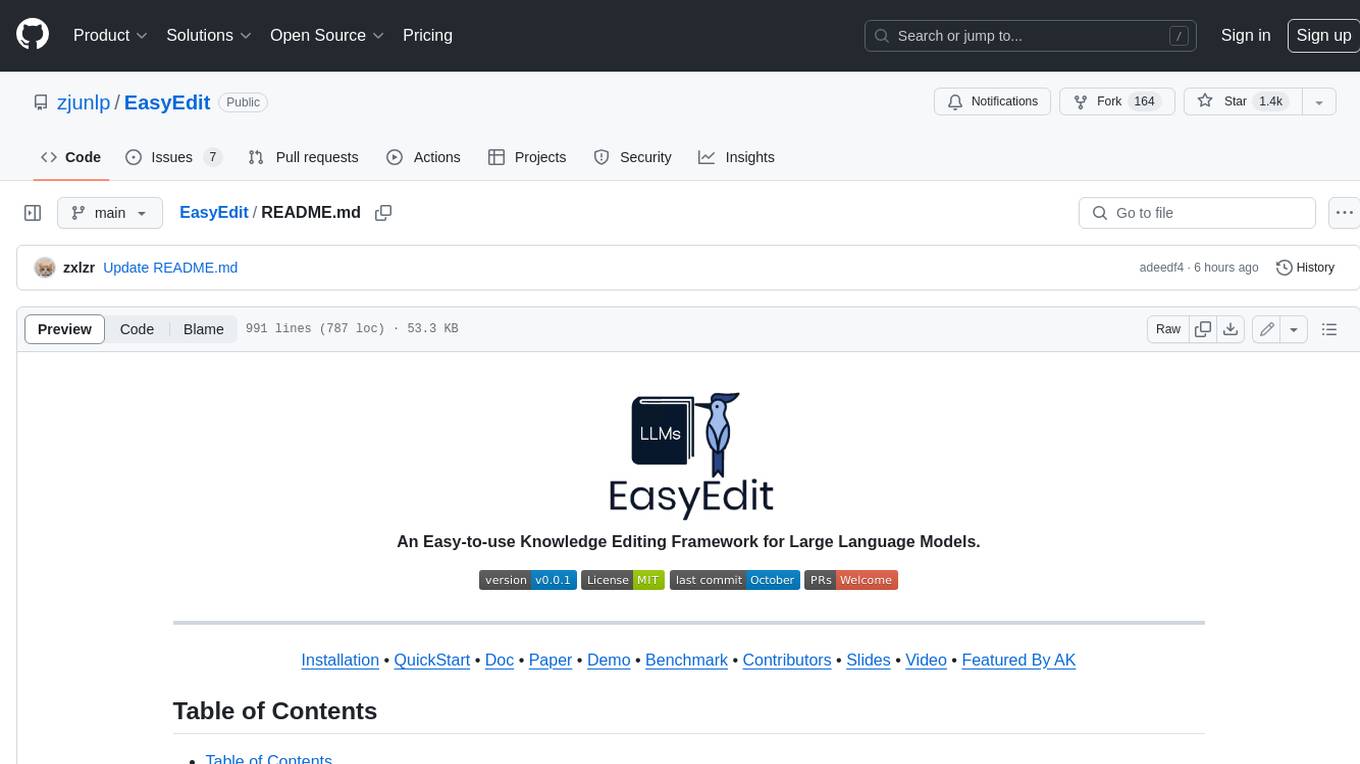
EasyEdit
EasyEdit is a Python package for edit Large Language Models (LLM) like `GPT-J`, `Llama`, `GPT-NEO`, `GPT2`, `T5`(support models from **1B** to **65B**), the objective of which is to alter the behavior of LLMs efficiently within a specific domain without negatively impacting performance across other inputs. It is designed to be easy to use and easy to extend.
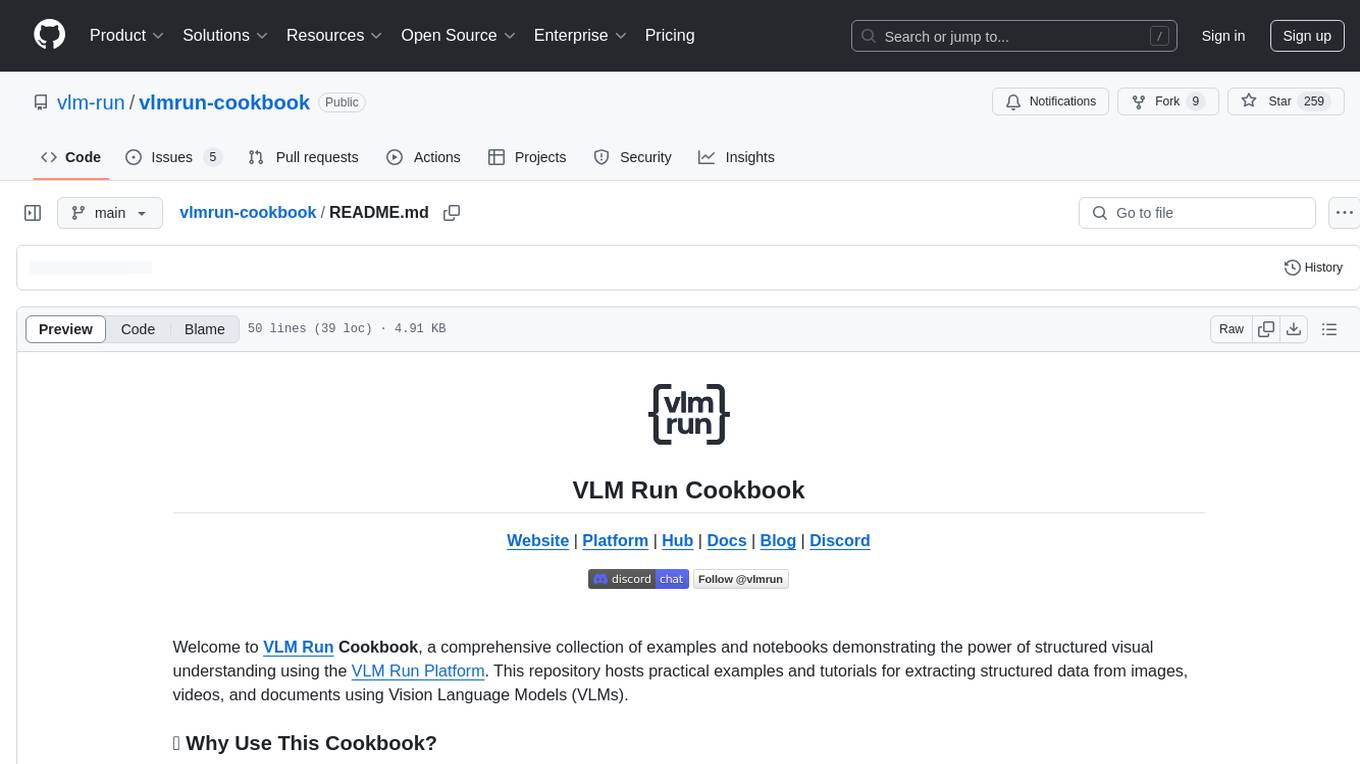
vlmrun-cookbook
VLM Run Cookbook is a repository containing practical examples and tutorials for extracting structured data from images, videos, and documents using Vision Language Models (VLMs). It offers comprehensive Colab notebooks demonstrating real-world applications of VLM Run, with complete code and documentation for easy adaptation. The examples cover various domains such as financial documents and TV news analysis.
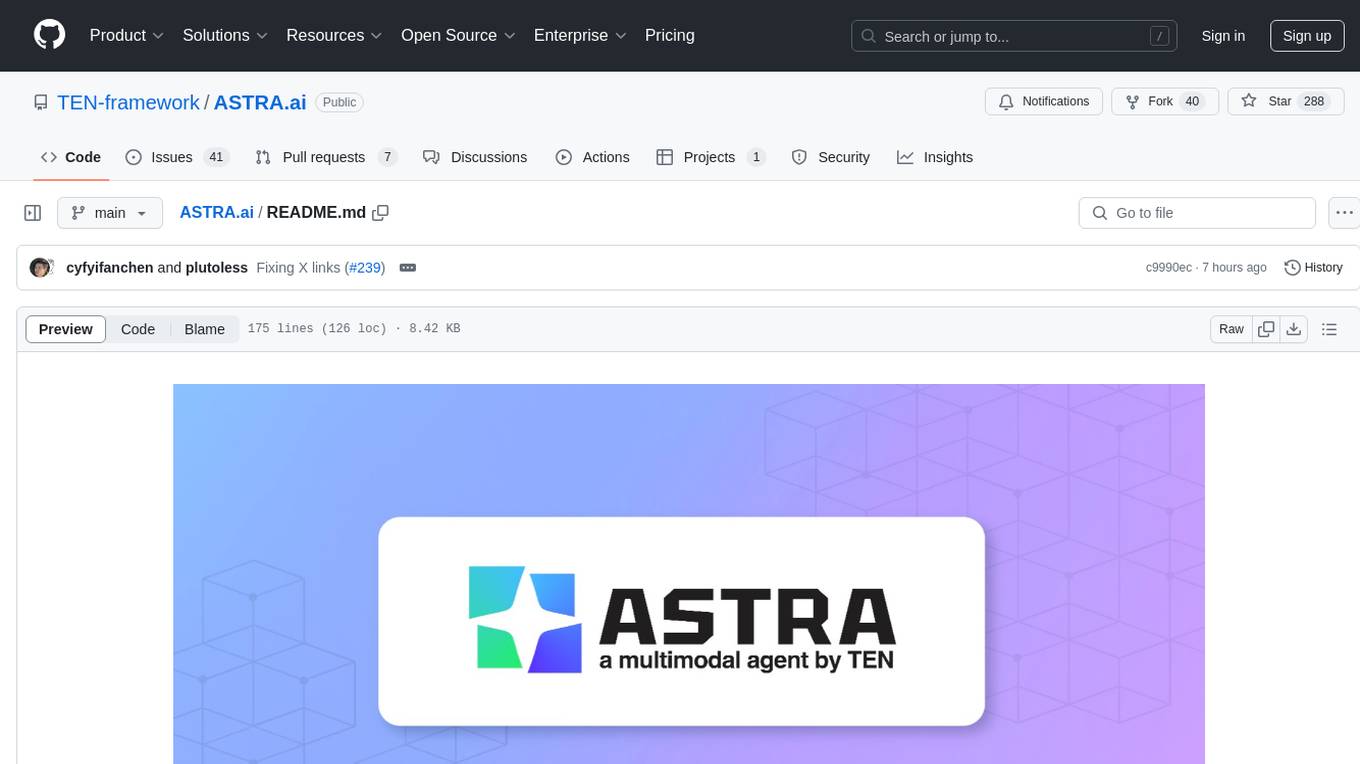
ASTRA.ai
Astra.ai is a multimodal agent powered by TEN, showcasing its capabilities in speech, vision, and reasoning through RAG from local documentation. It provides a platform for developing AI agents with features like RTC transportation, extension store, workflow builder, and local deployment. Users can build and test agents locally using Docker and Node.js, with prerequisites including Agora App ID, Azure's speech-to-text and text-to-speech API keys, and OpenAI API key. The platform offers advanced customization options through config files and API keys setup, enabling users to create and deploy their AI agents for various tasks.
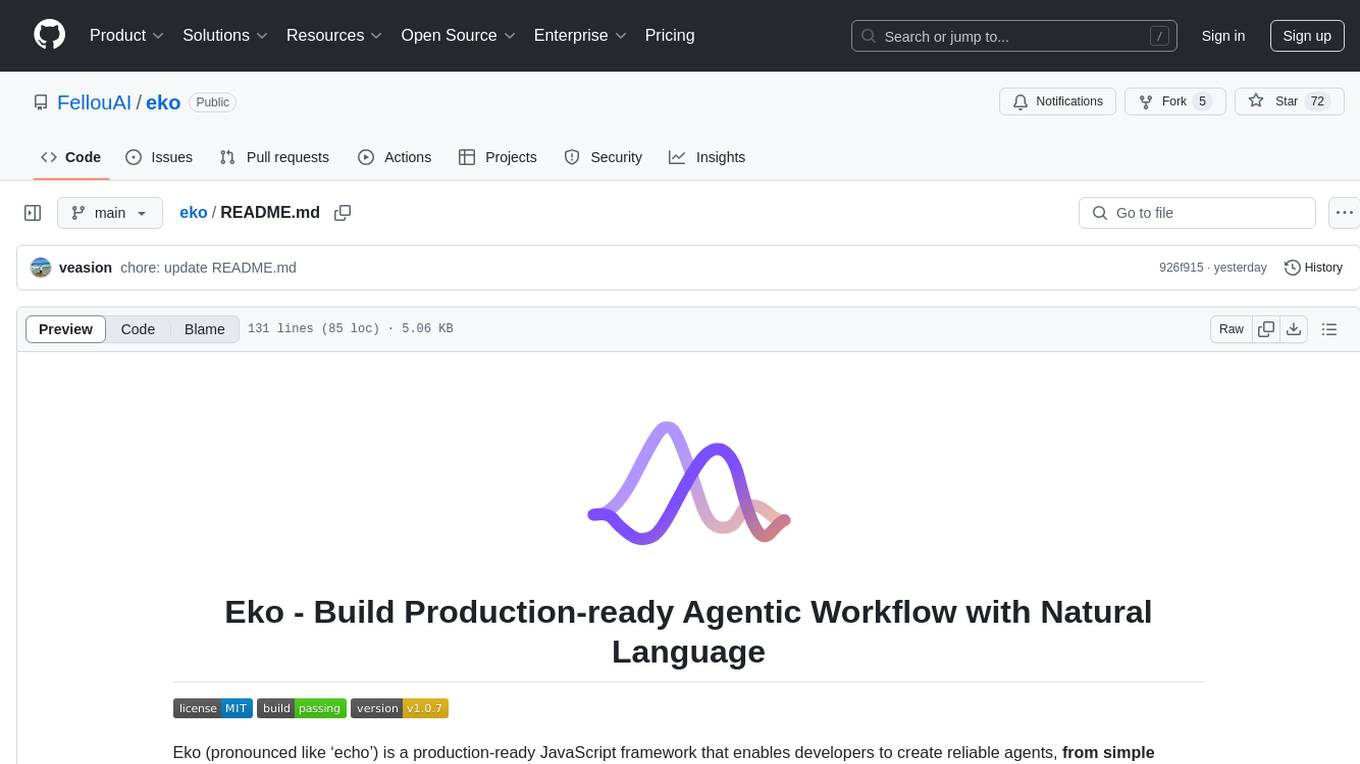
eko
Eko is a lightweight and flexible command-line tool for managing environment variables in your projects. It allows you to easily set, get, and delete environment variables for different environments, making it simple to manage configurations across development, staging, and production environments. With Eko, you can streamline your workflow and ensure consistency in your application settings without the need for complex setup or configuration files.
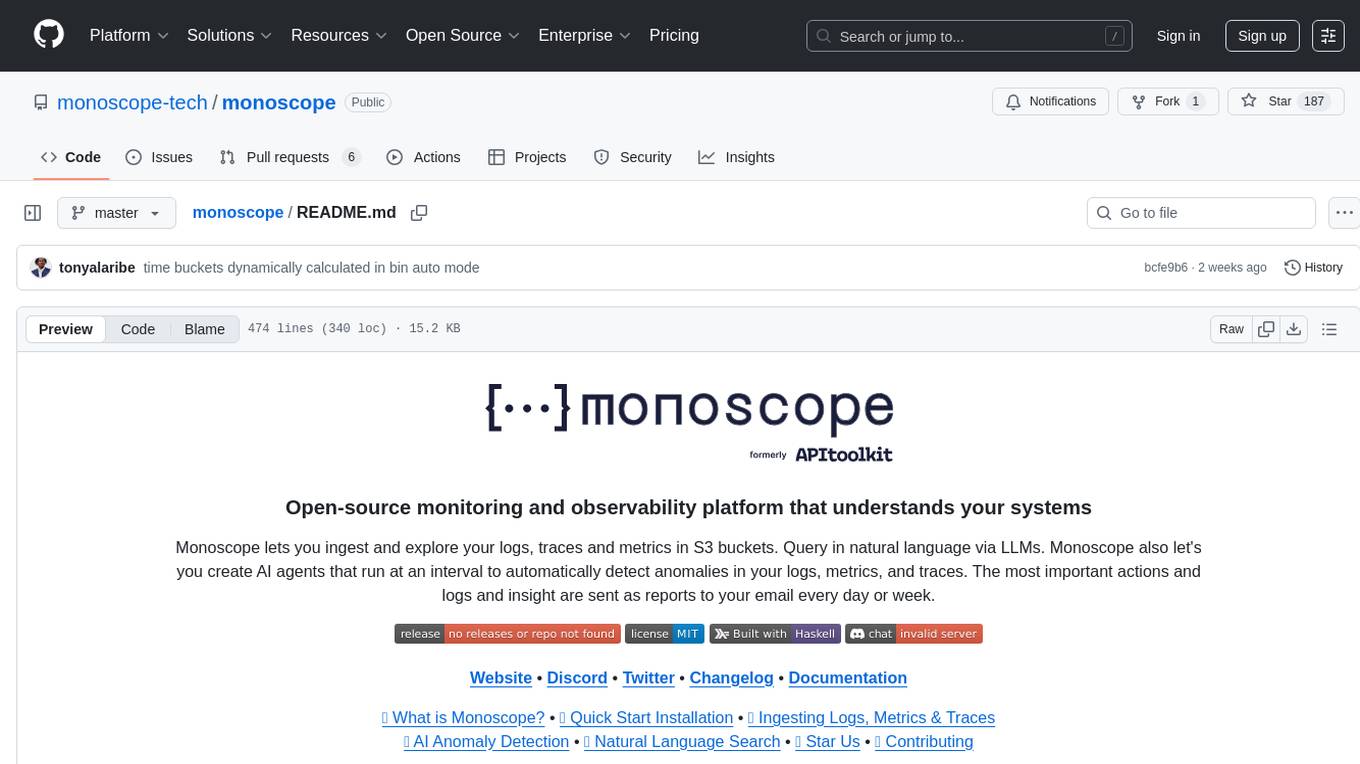
monoscope
Monoscope is an open-source monitoring and observability platform that uses artificial intelligence to understand and monitor systems automatically. It allows users to ingest and explore logs, traces, and metrics in S3 buckets, query in natural language via LLMs, and create AI agents to detect anomalies. Key capabilities include universal data ingestion, AI-powered understanding, natural language interface, cost-effective storage, and zero configuration. Monoscope is designed to reduce alert fatigue, catch issues before they impact users, and provide visibility across complex systems.
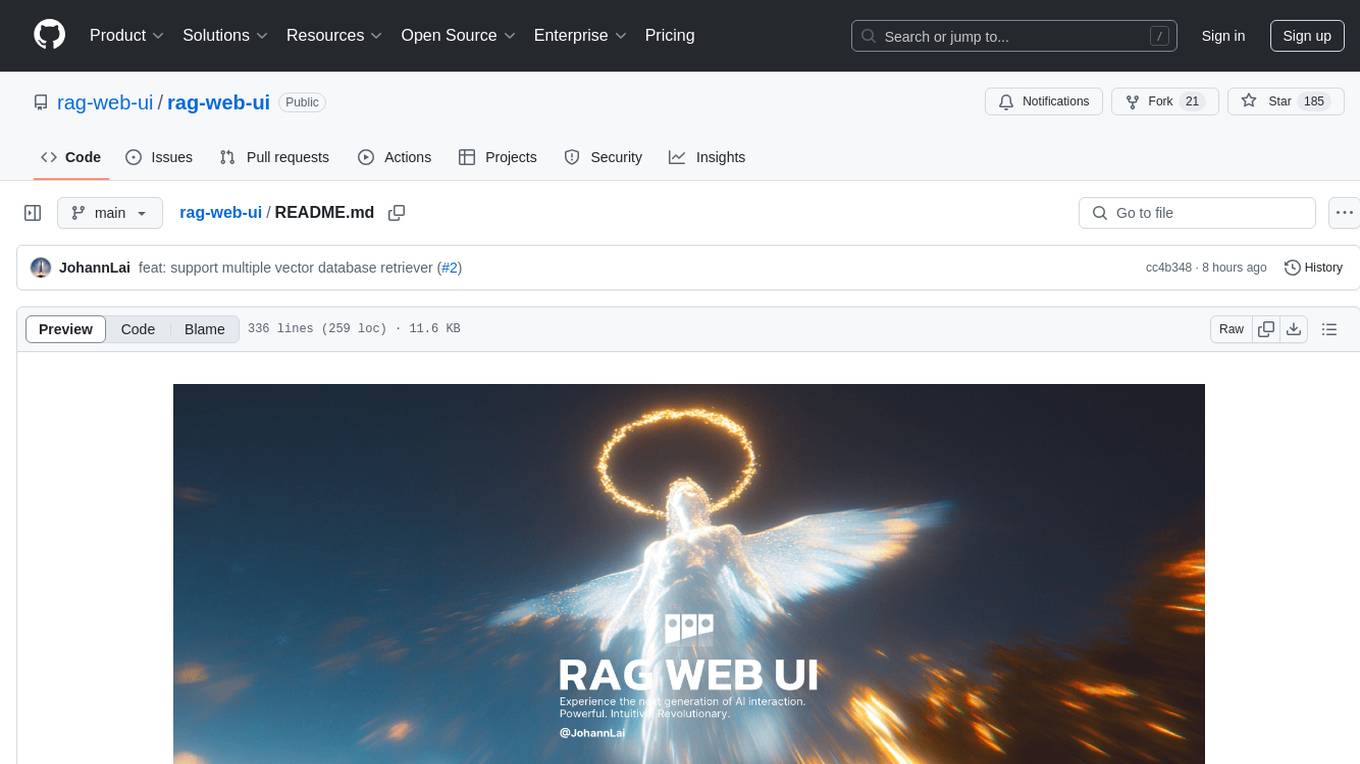
rag-web-ui
RAG Web UI is an intelligent dialogue system based on RAG (Retrieval-Augmented Generation) technology. It helps enterprises and individuals build intelligent Q&A systems based on their own knowledge bases. By combining document retrieval and large language models, it delivers accurate and reliable knowledge-based question-answering services. The system is designed with features like intelligent document management, advanced dialogue engine, and a robust architecture. It supports multiple document formats, async document processing, multi-turn contextual dialogue, and reference citations in conversations. The architecture includes a backend stack with Python FastAPI, MySQL + ChromaDB, MinIO, Langchain, JWT + OAuth2 for authentication, and a frontend stack with Next.js, TypeScript, Tailwind CSS, Shadcn/UI, and Vercel AI SDK for AI integration. Performance optimization includes incremental document processing, streaming responses, vector database performance tuning, and distributed task processing. The project is licensed under the Apache-2.0 License and is intended for learning and sharing RAG knowledge only, not for commercial purposes.
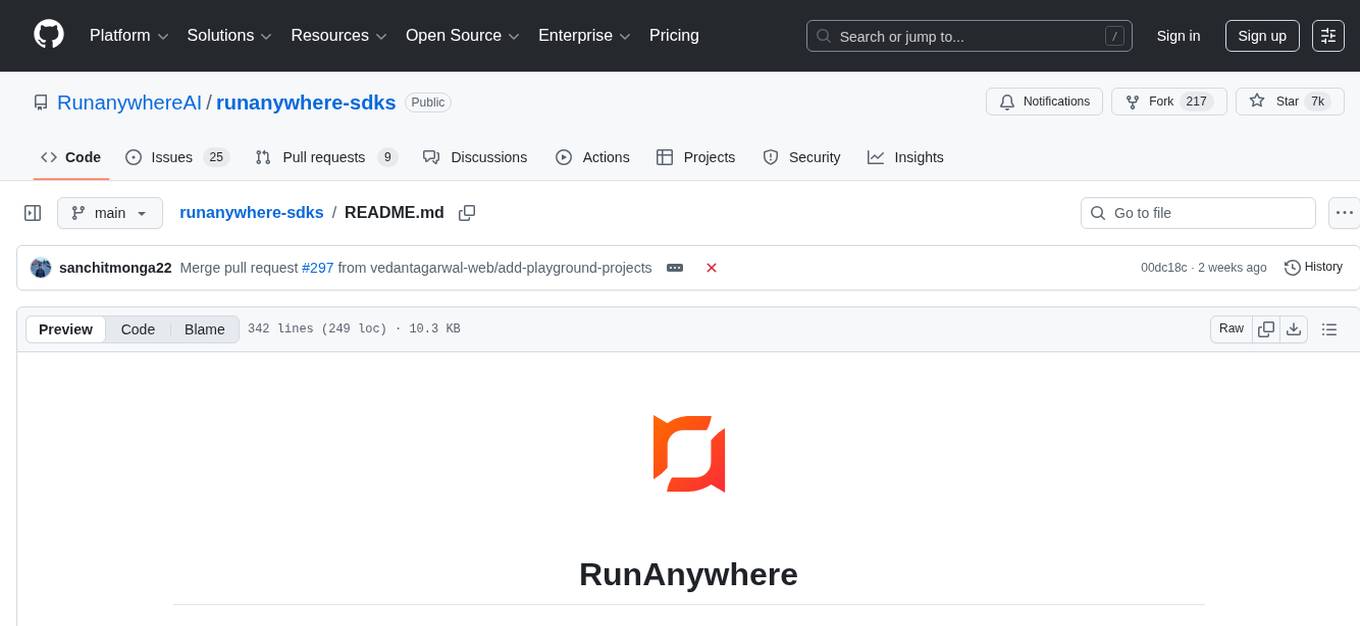
runanywhere-sdks
RunAnywhere is an on-device AI tool for mobile apps that allows users to run LLMs, speech-to-text, text-to-speech, and voice assistant features locally, ensuring privacy, offline functionality, and fast performance. The tool provides a range of AI capabilities without relying on cloud services, reducing latency and ensuring that no data leaves the device. RunAnywhere offers SDKs for Swift (iOS/macOS), Kotlin (Android), React Native, and Flutter, making it easy for developers to integrate AI features into their mobile applications. The tool supports various models for LLM, speech-to-text, and text-to-speech, with detailed documentation and installation instructions available for each platform.
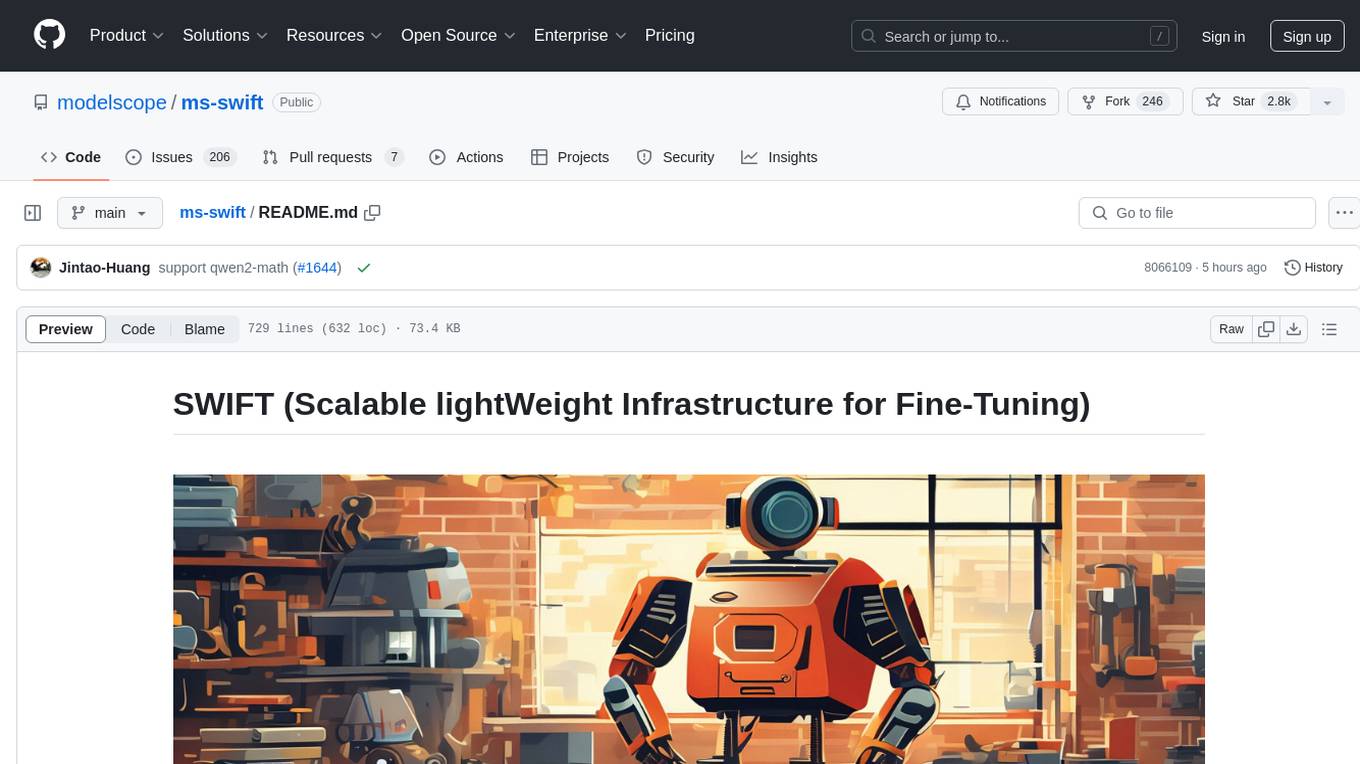
ms-swift
ms-swift is an official framework provided by the ModelScope community for fine-tuning and deploying large language models and multi-modal large models. It supports training, inference, evaluation, quantization, and deployment of over 400 large models and 100+ multi-modal large models. The framework includes various training technologies and accelerates inference, evaluation, and deployment modules. It offers a Gradio-based Web-UI interface and best practices for easy application of large models. ms-swift supports a wide range of model types, dataset types, hardware support, lightweight training methods, distributed training techniques, quantization training, RLHF training, multi-modal training, interface training, plugin and extension support, inference acceleration engines, model evaluation, and model quantization.
For similar tasks
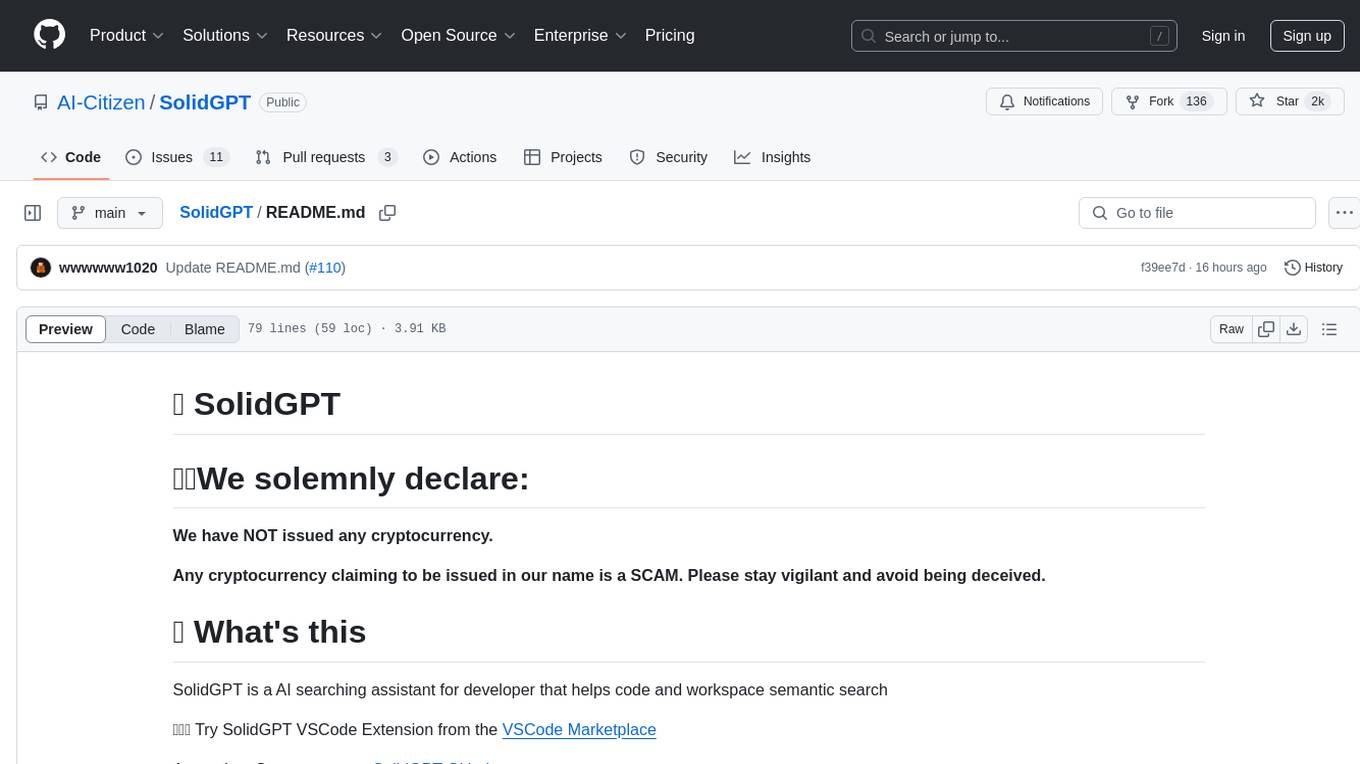
SolidGPT
SolidGPT is an AI searching assistant for developers that helps with code and workspace semantic search. It provides features such as talking to your codebase, asking questions about your codebase, semantic search and summary in Notion, and getting questions answered from your codebase and Notion without context switching. The tool ensures data safety by not collecting users' data and uses the OpenAI series model API.

pr-agent
PR-Agent is a tool designed to assist in efficiently reviewing and handling pull requests by providing AI feedback and suggestions. It offers various tools such as Review, Describe, Improve, Ask, Update CHANGELOG, and more, with the ability to run them via different interfaces like CLI, PR Comments, or automatically triggering them when a new PR is opened. The tool supports multiple git platforms and models, emphasizing real-life practical usage and modular, customizable tools.
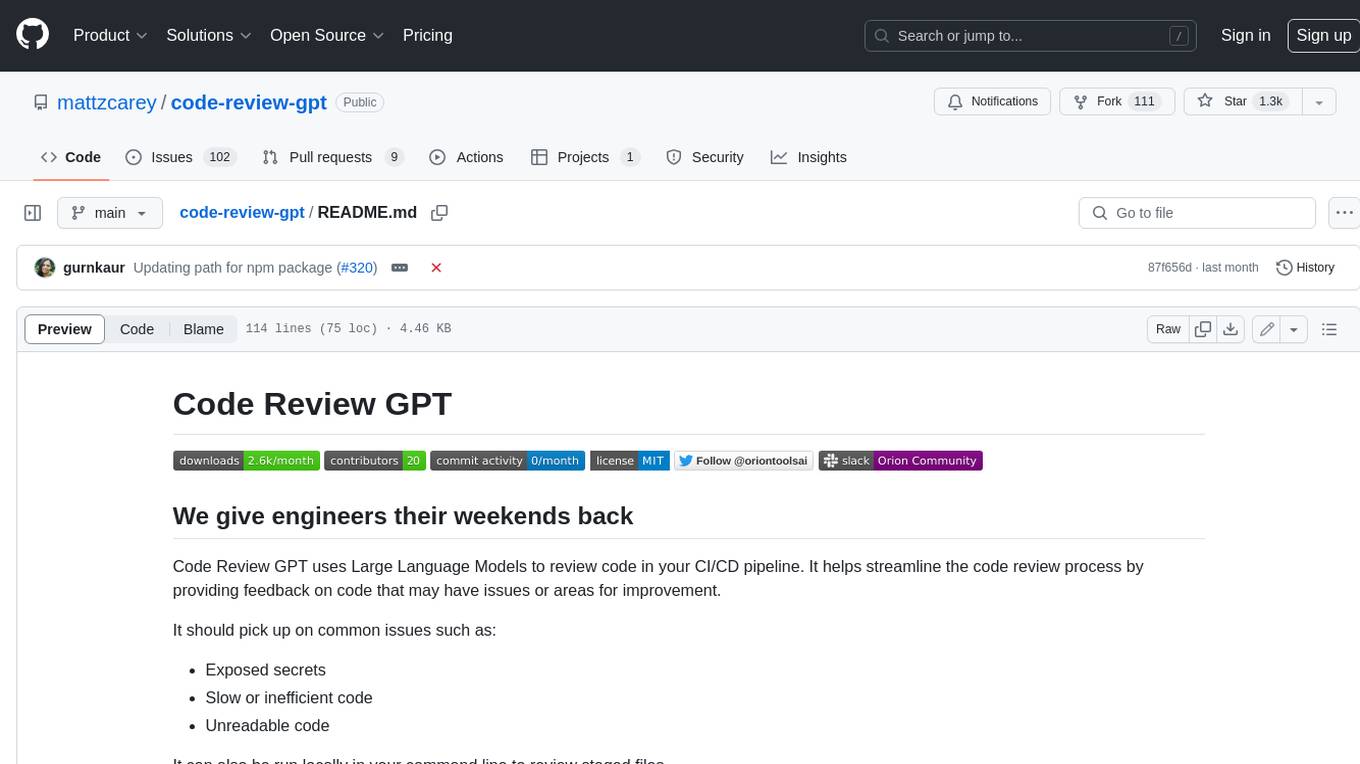
code-review-gpt
Code Review GPT uses Large Language Models to review code in your CI/CD pipeline. It helps streamline the code review process by providing feedback on code that may have issues or areas for improvement. It should pick up on common issues such as exposed secrets, slow or inefficient code, and unreadable code. It can also be run locally in your command line to review staged files. Code Review GPT is in alpha and should be used for fun only. It may provide useful feedback but please check any suggestions thoroughly.
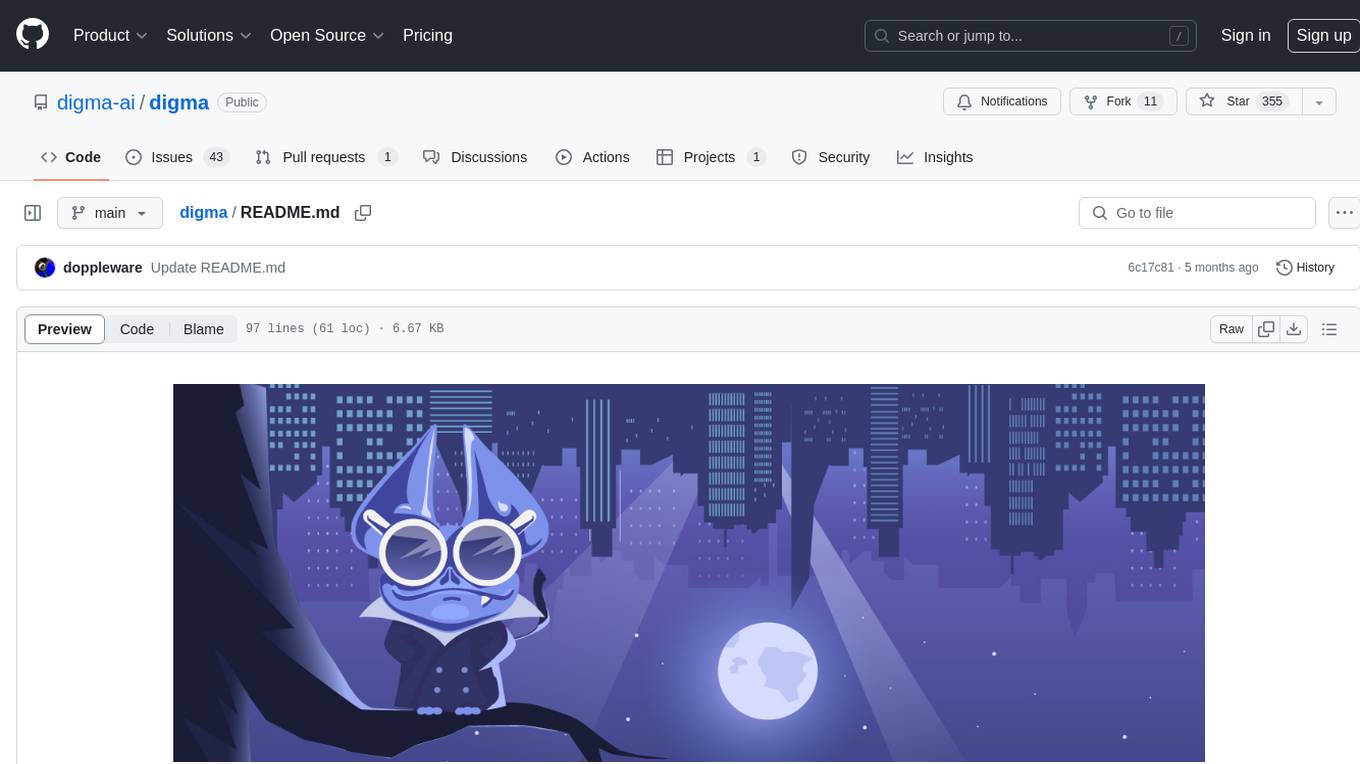
digma
Digma is a Continuous Feedback platform that provides code-level insights related to performance, errors, and usage during development. It empowers developers to own their code all the way to production, improving code quality and preventing critical issues. Digma integrates with OpenTelemetry traces and metrics to generate insights in the IDE, helping developers analyze code scalability, bottlenecks, errors, and usage patterns.
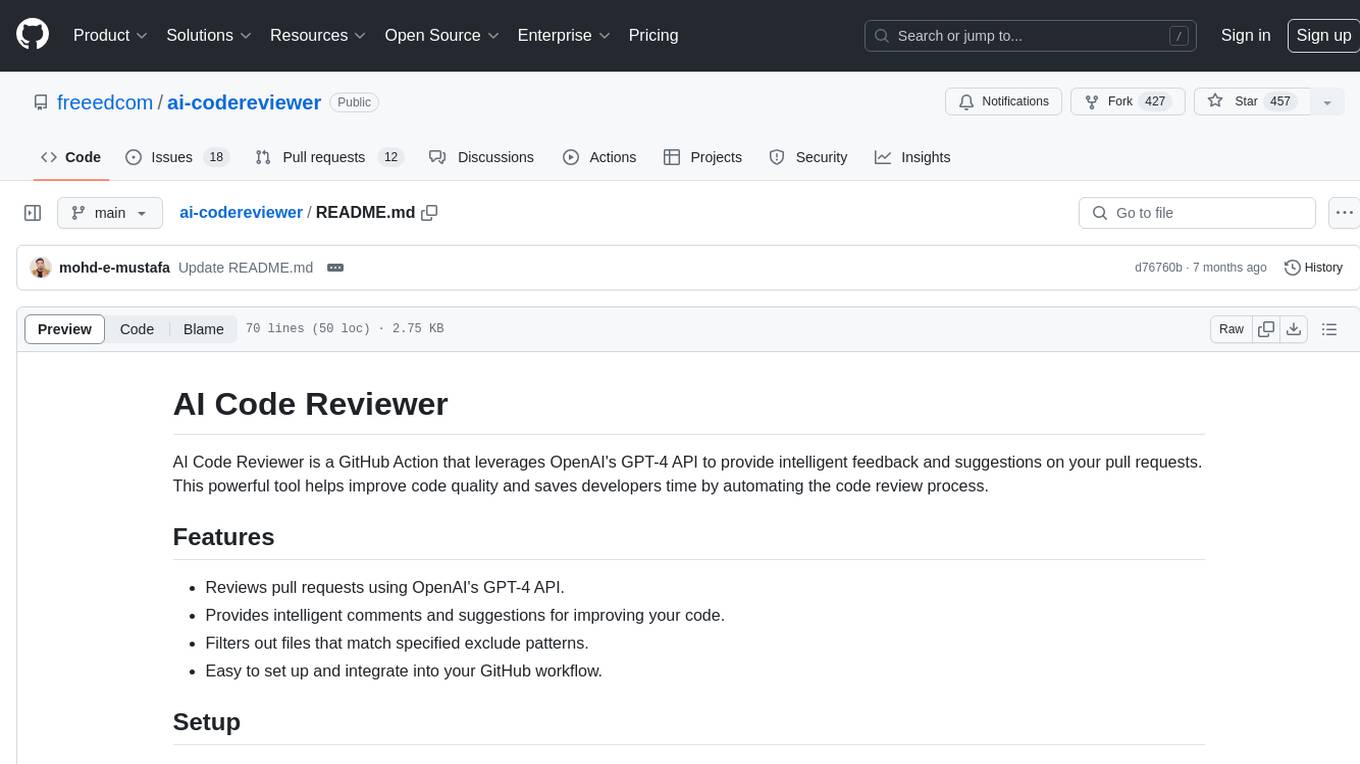
ai-codereviewer
AI Code Reviewer is a GitHub Action that utilizes OpenAI's GPT-4 API to provide intelligent feedback and suggestions on pull requests. It helps enhance code quality and streamline the code review process by offering insightful comments and filtering out specified files. The tool is easy to set up and integrate into GitHub workflows.
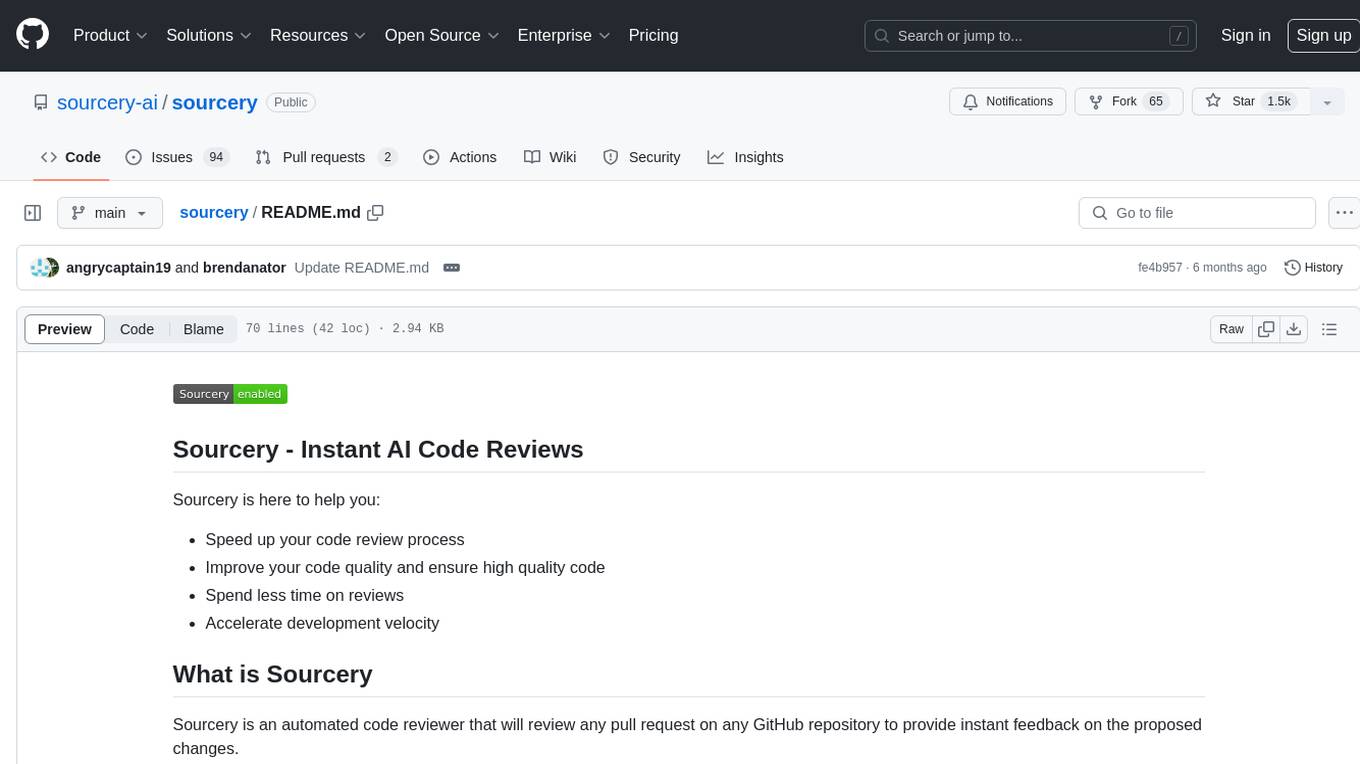
sourcery
Sourcery is an automated code reviewer tool that provides instant feedback on pull requests, helping to speed up the code review process, improve code quality, and accelerate development velocity. It offers high-level feedback, line-by-line suggestions, and aims to mimic the type of code review one would expect from a colleague. Sourcery can also be used as an IDE coding assistant to understand existing code, add unit tests, optimize code, and improve code quality with instant suggestions. It is free for public repos/open source projects and offers a 14-day trial for private repos.
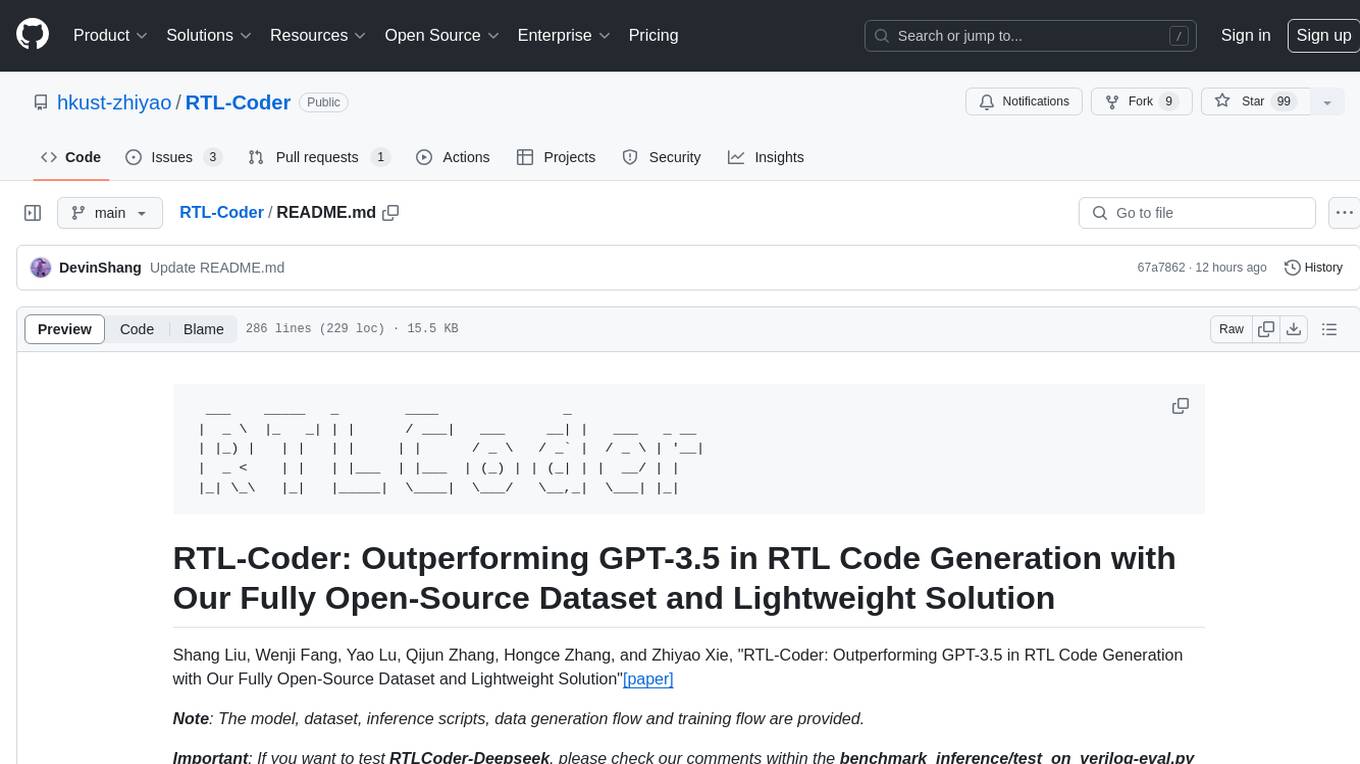
RTL-Coder
RTL-Coder is a tool designed to outperform GPT-3.5 in RTL code generation by providing a fully open-source dataset and a lightweight solution. It targets Verilog code generation and offers an automated flow to generate a large labeled dataset with over 27,000 diverse Verilog design problems and answers. The tool addresses the data availability challenge in IC design-related tasks and can be used for various applications beyond LLMs. The tool includes four RTL code generation models available on the HuggingFace platform, each with specific features and performance characteristics. Additionally, RTL-Coder introduces a new LLM training scheme based on code quality feedback to further enhance model performance and reduce GPU memory consumption.
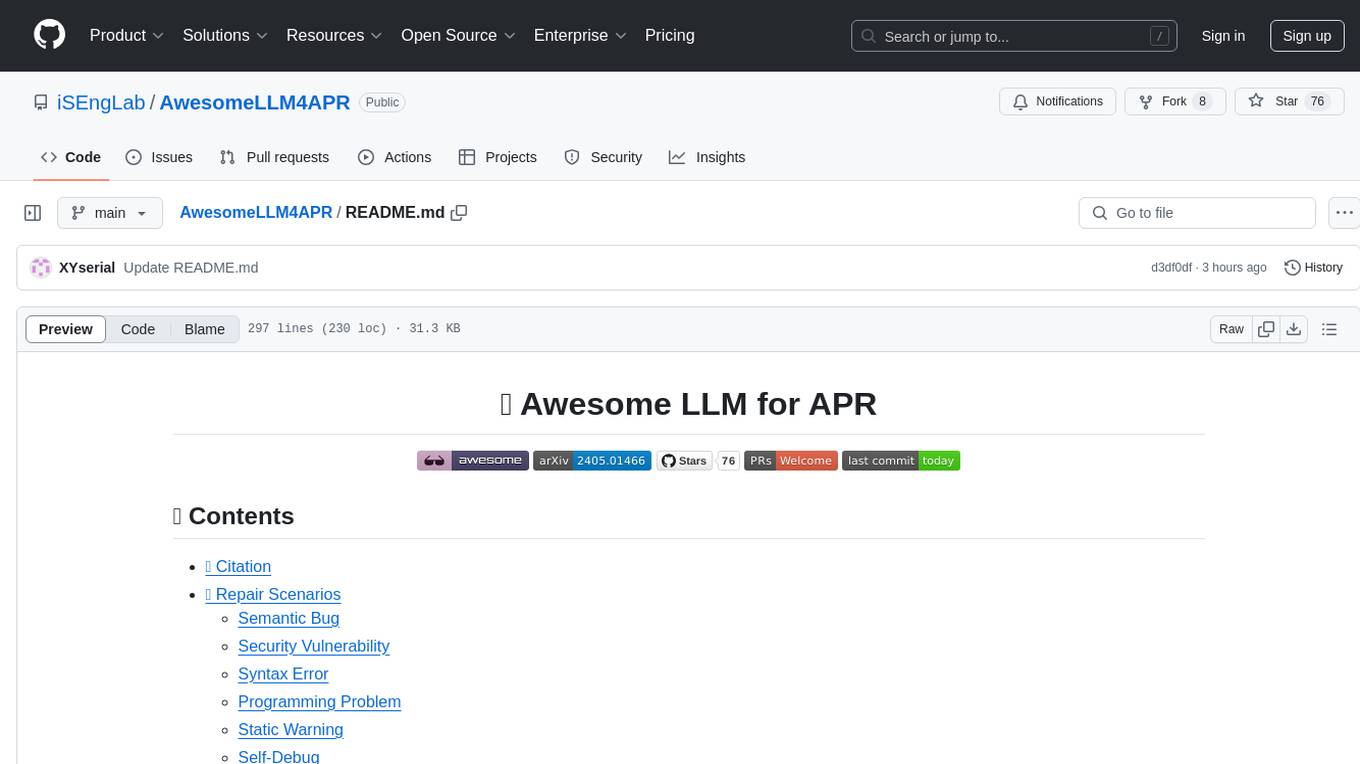
AwesomeLLM4APR
Awesome LLM for APR is a repository dedicated to exploring the capabilities of Large Language Models (LLMs) in Automated Program Repair (APR). It provides a comprehensive collection of research papers, tools, and resources related to using LLMs for various scenarios such as repairing semantic bugs, security vulnerabilities, syntax errors, programming problems, static warnings, self-debugging, type errors, web UI tests, smart contracts, hardware bugs, performance bugs, API misuses, crash bugs, test case repairs, formal proofs, GitHub issues, code reviews, motion planners, human studies, and patch correctness assessments. The repository serves as a valuable reference for researchers and practitioners interested in leveraging LLMs for automated program repair.
For similar jobs

sweep
Sweep is an AI junior developer that turns bugs and feature requests into code changes. It automatically handles developer experience improvements like adding type hints and improving test coverage.

teams-ai
The Teams AI Library is a software development kit (SDK) that helps developers create bots that can interact with Teams and Microsoft 365 applications. It is built on top of the Bot Framework SDK and simplifies the process of developing bots that interact with Teams' artificial intelligence capabilities. The SDK is available for JavaScript/TypeScript, .NET, and Python.

ai-guide
This guide is dedicated to Large Language Models (LLMs) that you can run on your home computer. It assumes your PC is a lower-end, non-gaming setup.

classifai
Supercharge WordPress Content Workflows and Engagement with Artificial Intelligence. Tap into leading cloud-based services like OpenAI, Microsoft Azure AI, Google Gemini and IBM Watson to augment your WordPress-powered websites. Publish content faster while improving SEO performance and increasing audience engagement. ClassifAI integrates Artificial Intelligence and Machine Learning technologies to lighten your workload and eliminate tedious tasks, giving you more time to create original content that matters.

chatbot-ui
Chatbot UI is an open-source AI chat app that allows users to create and deploy their own AI chatbots. It is easy to use and can be customized to fit any need. Chatbot UI is perfect for businesses, developers, and anyone who wants to create a chatbot.

BricksLLM
BricksLLM is a cloud native AI gateway written in Go. Currently, it provides native support for OpenAI, Anthropic, Azure OpenAI and vLLM. BricksLLM aims to provide enterprise level infrastructure that can power any LLM production use cases. Here are some use cases for BricksLLM: * Set LLM usage limits for users on different pricing tiers * Track LLM usage on a per user and per organization basis * Block or redact requests containing PIIs * Improve LLM reliability with failovers, retries and caching * Distribute API keys with rate limits and cost limits for internal development/production use cases * Distribute API keys with rate limits and cost limits for students

uAgents
uAgents is a Python library developed by Fetch.ai that allows for the creation of autonomous AI agents. These agents can perform various tasks on a schedule or take action on various events. uAgents are easy to create and manage, and they are connected to a fast-growing network of other uAgents. They are also secure, with cryptographically secured messages and wallets.

griptape
Griptape is a modular Python framework for building AI-powered applications that securely connect to your enterprise data and APIs. It offers developers the ability to maintain control and flexibility at every step. Griptape's core components include Structures (Agents, Pipelines, and Workflows), Tasks, Tools, Memory (Conversation Memory, Task Memory, and Meta Memory), Drivers (Prompt and Embedding Drivers, Vector Store Drivers, Image Generation Drivers, Image Query Drivers, SQL Drivers, Web Scraper Drivers, and Conversation Memory Drivers), Engines (Query Engines, Extraction Engines, Summary Engines, Image Generation Engines, and Image Query Engines), and additional components (Rulesets, Loaders, Artifacts, Chunkers, and Tokenizers). Griptape enables developers to create AI-powered applications with ease and efficiency.



